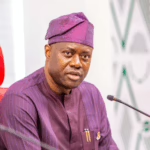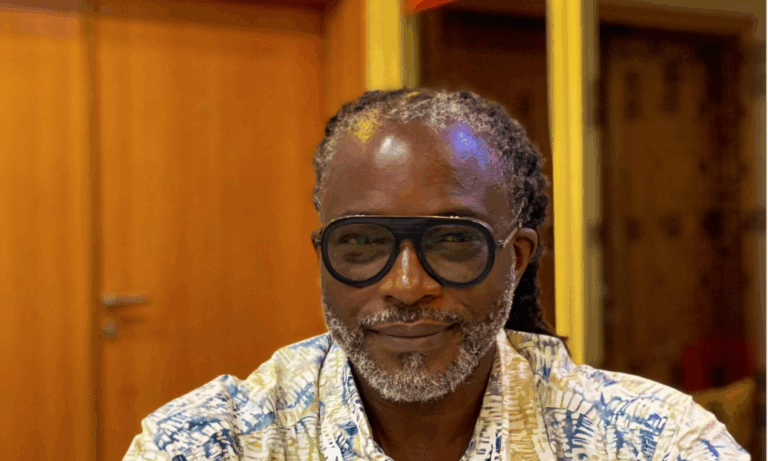Biyi Bandele
In 2022, shortly after the debut of Blood Sisters-Nigeria’s pioneering Netflix Original TV series co-directed by Biyi Bandele and Kenneth Gyang-I had the privilege of interviewing Biyi Bandele. Tragically, just three months following our conversation, Biyi passed away, leaving a profound void. His last message to me on WhatsApp mentioned his arrival at Heathrow Airport and his intention to read the interview once home. Whether he ever did remains unknown, especially since the original publication ceased operations. Revisiting the interview recently, I found its insights remain deeply relevant.
Originally published as follows:
–
Biyi Bandele once affectionately called me a child, sparking a burst of laughter that lasted nearly half a minute. This unexpected moment arose during a discussion initially focused on his directorial work on Blood Sisters. None of my prepared questions anticipated such a playful exchange.
He used the term “child” while recounting his attempt to meet the legendary Wole Soyinka at the University of Ile-Ife (now Obafemi Awolowo University), where he was studying Theatre Arts. After discovering Soyinka was a lecturer there through one of his poetry collections, Biyi applied to the university with hopes of meeting him. Unfortunately, Soyinka had retired four years prior to Biyi’s arrival. Yet, persistence paid off, and they met six months later. During our chat, Biyi mentioned Soyinka had produced a music album-a fact unfamiliar to me. Surprised, I asked, “Wole Soyinka made a music album?” He responded, “Yes, yes. You didn’t know? How old are you?” When I said 22, he exclaimed, “Ah, you’re a child!” Interestingly, Soyinka penned the lyrics to Bobby Benson’s famous song, “If you marry a taxi driver, I don’t care.”
At 54, Biyi was in the process of writing a new book, now published as Yoruba Boy Running. Having authored several works, including the acclaimed 2007 novel Burma Boy-praised by The Independent’s Toby Gould as “a fine achievement”-Biyi described himself during a phone call from Osogbo to Lagos as someone who “has been writing all my life.” For him, writing was a lifelong passion, whether through novels or films.
In this interview, Biyi shared insights into how he became the director of Blood Sisters, his early steps into directing, and his vision for Nollywood’s future.
Can you share your journey as both a writer and a director?
“Writing has been a constant in my life,” Biyi began. “My first short story was published in Jos’s The Sunday Standard. I was born in Kafanchan, near Jos, and knew early on that I wanted to write. Unlike writing, directing wasn’t initially on my radar because I had mentors in literature-giants like Wole Soyinka, Chinua Achebe, and the authors featured in the African Writers Series. I didn’t know any directors personally. Growing up, I watched many films at the local cinema in Kafanchan-Bollywood, Hong Kong action flicks, Bruce Lee movies-which I loved. I didn’t see a stage play until I was about sixteen, after moving to Lagos. My roots are in Abeokuta, but it was at the National Theatre in Lagos that I first experienced theatre, and it captivated me. I enrolled in Theatre Arts at Ife, partly because Soyinka was a lecturer there, though he had retired four years before I arrived. I met him within six months, though. Later, moving to the UK sparked my interest in film. London’s cinemas and video stores exposed me to a vast array of movies. I even co-wrote a screenplay with Danny Boyle, who directed it, which deepened my passion for directing. I apprenticed for about a decade, watching up to four films daily, absorbing storytelling techniques. Eventually, I began writing screenplays for others and felt ready to direct. My first feature was Half of a Yellow Sun, adapted from Chimamanda Ngozi Adichie’s novel. It took seven years to come to fruition. When it was released, it faced harsh criticism and attempts to undermine it, which was tough, but I persevered. Without that experience, I wouldn’t have been invited to direct Blood Sisters.”
How do you juggle directing with your creative writing?
“I remain a writer at heart and am currently working on a new book,” he said. “Being Nigerian, I grew up admiring creatives like Wole Soyinka, who was not only a writer but also a filmmaker, musician, activist, and more. I believe a true artist should embrace multiple forms of creativity.”
How did you come to direct Blood Sisters?
“I met Mo Abudu at a party celebrating Chiwetel Ejiofor, who starred in Half of a Yellow Sun. Though we knew of each other, we weren’t close. She mentioned she had been trying to reach me and wanted me involved in a project. I asked her to send the script. A few weeks later, I received a lengthy screenplay titled 50, about 160 pages. I saw potential but felt it was overly melodramatic. I suggested bringing in another writer to revise it, but that only introduced new issues. So, I rewrote it myself, condensing it to under 50 pages. It was initially intended as a feature film, and we shot it in two to three days. Meanwhile, I continued other work. In 2020, while in New York, Mo contacted me about directing a different project, but that was postponed when Blood Sisters became available after the original director withdrew. I didn’t inquire why or who it was. Mo called me on a Friday night while I was writing a book and asked for my decision by Monday. After reviewing the story summary and script, I was excited. The cast and pre-production were already set; my role was purely directing. I gave it my all, even though I usually develop scripts and cast actors myself. This was a chance to test my directing skills, and it turned out wonderfully.”
Blood Sisters has been a massive success internationally. How does that feel?
“It’s incredible. The show is currently the number one series on Netflix worldwide, topping charts in North America, the United States, and beyond.”
Since the casting was done before you joined, did you ever feel a mismatch between actors and their roles?
“That’s a great question. Initially, I was thrilled to work with such talented Nollywood actors. I told myself I would make the best film possible regardless. However, I wouldn’t work under those conditions again. I didn’t dwell on any misalignments because overthinking would have introduced fear. I wanted to embrace the challenge and enjoy the process.”
One curious detail in Blood Sisters is the use of voicemail, which isn’t common in Nigeria. What are your thoughts?
“Voicemail does exist in Nigeria, though it’s not widespread. I personally haven’t used it, but many people do. Just because it’s not common doesn’t mean it shouldn’t appear in stories. We’re not only reflecting Nigerian realities but also crafting narratives. For example, we included police procedures that are accurate, consulting advisors and referencing real photos. While such scenes aren’t always typical in Nigeria, they do happen. I recently witnessed a police chase in Victoria Island that resembled scenes from Bollywood or Hollywood films.”
Do you believe art must be flawless?
“Perfection is a myth. Every creator makes choices about how to tell their story and what to emphasize. Criticism and storytelling are subjective.”
What is your outlook on Nollywood’s future? How has it evolved, and what role does Blood Sisters play in that evolution?
“Nollywood is brimming with exceptional talent across generations-actors like Ramsey Nouah, Kate Henshaw, and many others who can stand alongside any global performers. My joy lies in bridging these generations. Nollywood continues to grow and transform, and I’m confident it will keep advancing.”
Interview edited for clarity and conciseness.


















0 Comments